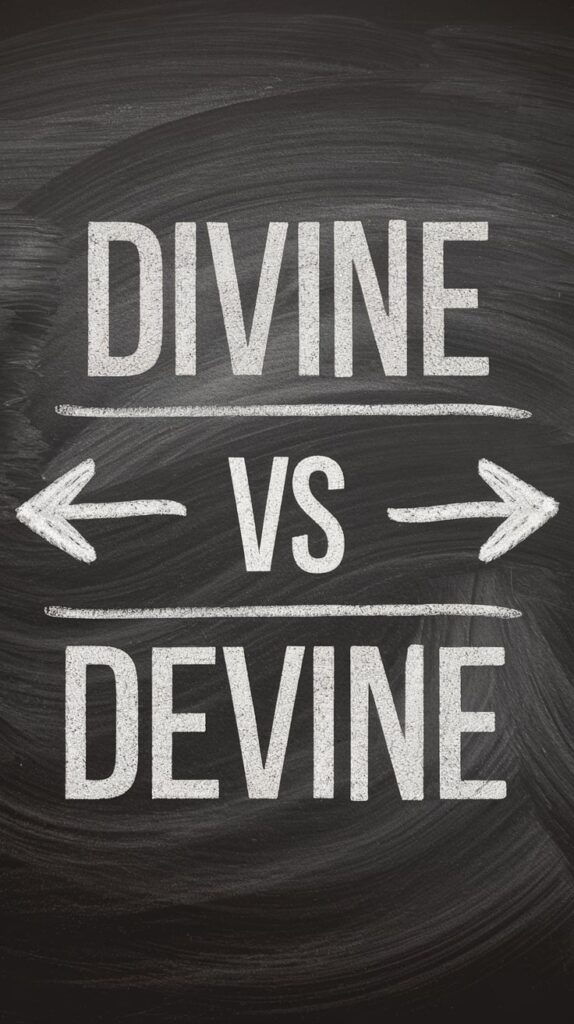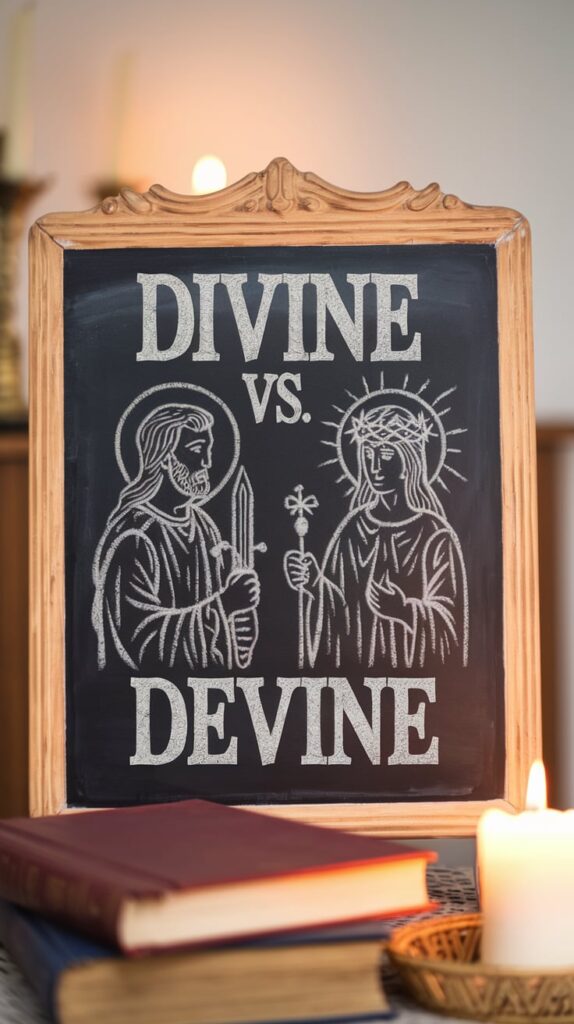Introduction
Language serves as a bridge for communication, enabling us to express thoughts, emotions, and ideas. Yet, within this intricate system, some words can easily trip us up. One such pair is “devine” vs “divine.”
Though they may sound similar, they possess distinctly different meanings and usages. This article will thoroughly explore devine vs divine: getting the right word, highlighting definitions, examples, and common pitfalls.
Correct Spelling and Grammar Rules
Understanding spelling and grammar is foundational to effective communication. The first step in differentiating between “devine” vs “divine” is recognizing that “devine” is often a misspelling of “divine.” The correct term is “divine,” and knowing how to use it properly is essential for clear communication.
Key Takeaways
- “Divine” is the correct spelling.
- “Devine” is a frequent misspelling.
- Using the correct term is vital for effective writing and speech.
How to Pronounce Divine
Before diving deeper into meanings and usages, let’s clarify pronunciation. “Divine” is pronounced as /dɪˈvaɪn/. The emphasis is on the second syllable, which gives it a melodious and sophisticated tone.

like more : 15 Other Ways to Say “Thank You for the Clarification” – Grammar Beacon
Example Scenario:
Imagine you’re discussing a classic novel in a book club. Someone might remark:
“That character’s motivations are truly divine!”
In this context, the speaker praises the character’s depth and complexity.
Meaning of Divine
The term “divine” carries multiple meanings, but it primarily refers to anything that is related to a deity or god. Additionally, it can describe something heavenly, supremely good, or extraordinarily beautiful.
Contextual Meanings
Religious Context:
“Many believe that a divine presence guides their lives.”
Descriptive Context:
“The meal was simply divine; every bite was a delight!”
Synonyms for Divine
- Heavenly
- Godly
- Sacred
- Exquisite
Understanding these synonyms broadens your comprehension of how “divine” can be employed in various contexts.
like more : Appendices or Appendixes – Grammar Beacon
Why is There Confusion Between Devine vs Divine ?
The mix-up between “devine” vs ‘‘divine’’ often arises from phonetic similarities and typographical errors.
Common Reasons for Confusion:
- Phonetic Similarity: Both words sound alike, making them easy to confuse when spoken.
- Typing Errors: In the haste of typing, it’s common to mistakenly type “devine” instead of “divine.”
- Lack of Awareness: Some individuals may not realize that “devine” is incorrect and might use it habitually.
Recognizing these factors can help you steer clear of common spelling pitfalls.

Meaning of Devine
While “devine” may occasionally appear in casual writing, it does not have a recognized meaning in standard English. In some instances, people might mistakenly use “devine” when they intend to convey the concept of something “divine.”
Example Scenario:
Consider a casual conversation where someone states:
“I found that movie absolutely devine!”
In this case, the speaker meant to say “divine,” leading to a misunderstanding.
Using Divine in English
“Divine” is a versatile word that can be applied in various contexts, from literary works to everyday discussions. Here are some essential guidelines for using “divine” correctly.
like more : Preform vs Perform – Grammar Beacon
Formal vs. Informal Usage
Formal Usage:
“The divine attributes of the painting evoke deep emotions.”
Informal Usage:
“This dessert is divine! You have to try it!”
Common Contexts for Divine
- Religious Texts: Often used to describe aspects of spirituality or theological discussions.
- Art and Music: Employed to convey beauty or excellence in creative expressions.
- Everyday Life: Utilized to express delight or admiration for enjoyable experiences.
Common Mistakes to Avoid
When navigating the devine vs divine dilemma, here are common mistakes to watch out for:
- Using Devine Instead of Divine: Always choose “divine.”
- Confusing Contexts: Ensure that you are using “divine” in contexts that convey the intended meaning.
- Ignoring Spelling: Always double-check your writing for spelling errors, especially if typing quickly.
Quick Tips
- Use spell-check tools in word processors.
- Read your writing out loud to catch any awkward phrasing or mistakes.
Sentence Examples Using Divine
Here are illustrative sentence examples showcasing the proper use of “divine.”
Religious Example:
“The scriptures provide divine guidance for believers.”
Literary Example:
“The poet’s divine inspiration led to an unforgettable masterpiece.”
Everyday Example:
“The concert was a divine experience that I’ll cherish forever.”
Artistic Example:
“The divine beauty of the landscape took my breath away.”
Culinary Example:
“After trying that dish, I can confidently say it was a divine experience.”
These examples illustrate the versatility of “divine” across various contexts, highlighting its correct usage.
like more : Vicious vs Viscous – Grammar Beacon
Why It Matters
Understanding the distinction between “devine” vs “divine” is crucial for effective communication. Misspellings can lead to misunderstandings and can undermine your credibility as a writer or speaker.
Utilizing the correct term enhances your writing and reflects your commitment to clarity and precision.
The Bigger Picture
In a world where effective communication is increasingly important, honing your language skills is invaluable. Mastering small nuances, such as the devine vs divine distinction, paves the way for more articulate and compelling expressions of thought.
Frequently Asked Questions
Can I use divine in both formal and informal settings?
Yes, “divine” is versatile enough to fit both formal and informal contexts. Just ensure you are using it correctly based on the situation.
Why do people confuse devine and divine?
Most people confuse “devine” and “divine” due to their similar sounds and the potential for typographical errors. A lack of awareness about the correct spelling also contributes to this confusion.

Is it acceptable to use devine in any context?
While “devine” might appear in casual contexts, it is technically incorrect. It’s best to stick with “divine” to maintain clarity and credibility in your writing.
How can I improve my spelling of tricky words?
Regular practice, reading, and utilizing spell-check tools can significantly enhance your spelling skills. Pay special attention to commonly confused words like “devine” vs “divine.”
Can using these words incorrectly affect my writing?
Yes, using “devine” instead of “divine” can lead to misunderstandings and can detract from your professionalism as a writer. Always strive for accuracy in your word choice.
Cultural Context of Divine
Understanding “divine” also involves recognizing its cultural significance. The concept of the divine transcends religious boundaries, appearing in art, literature, and everyday conversations. Here are some cultural aspects related to the term.
Divine in Art
Art often seeks to capture the divine essence, whether through religious imagery or natural beauty. Artists like Michelangelo and Da Vinci infused their works with themes that invoke a sense of the divine.
like more : Axle or Axel – Grammar Beacon
Divine in Literature
Literature often explores themes of the divine, questioning humanity’s relationship with God or higher powers. Works from authors like Dante and Milton reflect on the divine nature and human existence.
Divine in Everyday Life
In everyday conversations, people may refer to experiences or moments that evoke feelings of awe or beauty as “divine.” This usage underscores the human desire to connect with something greater.
Sentence Examples from Various Contexts
Let’s delve deeper into divine by providing a broader array of sentence examples across different contexts.

Religious Context
- “The community gathered for the divine service to seek guidance and solace.”
- “The ancient scriptures are often interpreted as divine revelations.”
Literary Context
- “The poet described the sunrise as a divine gift from nature.”
- “Her writings reflect a divine understanding of the human condition.”
Artistic Context
- “The artist aimed to portray the divine through ethereal landscapes and heavenly figures.”
- “Critics hailed the performance as a divine expression of artistic talent.”
Culinary Context
- “The chef’s creation was so unique that diners called it a divine culinary experience.”
- “Every bite of the meal felt like a divine indulgence.”
Conclusion
In summary, mastering the distinction between “devine” vs “divine” is essential for anyone who wishes to communicate effectively. The correct term, “divine,” pertains to godly or heavenly concepts and can elevate your writing in various contexts.
Understanding the confusion surrounding these words can help you avoid common pitfalls and express your thoughts more clearly.
As you navigate the intricacies of the English language, remember that small details matter. Whether you’re writing an academic paper, composing an email, or engaging in casual conversation,
using the right words enhances your communication. So next time you need to express something beautiful, sacred, or excellent, make sure you choose “divine” over “devine.”
Your readers and listeners will appreciate your careful choice of words, making your communication more engaging and effective.
Embrace the beauty of the English language, and let your words reflect the depth and richness they possess. Language is not just a means of communication; it’s a way to connect with others and express the myriad experiences that make us human.
By focusing on the nuances of language, you not only improve your vocabulary but also contribute to a culture of clarity and precision in communication.
Additional Resources
If you wish to further enhance your understanding of language nuances, consider these resources:
- Online Grammar Guides: Websites like Grammarly and Purdue OWL offer extensive guidance on grammar and writing.
- Language Apps: Tools like Duolingo or Babbel can help you explore language intricacies.
- Books on Writing: Texts like “The Elements of Style” by Strunk and White provide timeless advice on clear writing.
By investing time in understanding these subtleties, you enrich not only your own communication but also contribute to a more articulate and expressive world. Understanding the distinctions between words like “devine” and “divine” serves as a reminder of the power of language to convey meaning and emotion. Let’s celebrate that power through careful choice and thoughtful expression.

James Logan is a seasoned blogger and language enthusiast behind Grammar Beacon. With years of experience in grammar and writing, James shares his expertise through insightful and engaging content. His passion for clear communication and linguistic precision shines in every post, making complex grammar concepts accessible and enjoyable for readers. Follow James for expert advice and tips to refine your writing skills.







